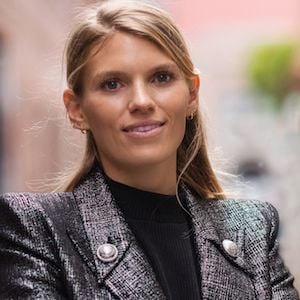Few tech companies have had a year as crazy as Modern Health. The San Francisco startup connects users with mental healthcare providers via its app, using data science tech and clinically validated self-assessments to personalize its services. But at the outset of the most prolonged and widespread mental health challenge in a generation, the 40-person team may have been forgiven for feeling a little out of its depth.
“We were blindsided like everyone else,” founder and CEO Alyson Watson told Built In.
But the company has met the moment, more than quintupling in size to about 220 people and adding more than $120 million to its funding warchest. As it strained to meet exploding demand, Watson said she learned the real value of the service Modern Health provides — successful businesses take care of employees’ mental health. And she said those that ignore the holistic well-being of their workers — including mental health — risk being overwhelmed in tech’s ongoing “war for talent.”
In a wide-ranging conversation, Watson shared the management lessons she hopes the industry has learned from the past 18 months. And in a time when many organizations are still frantically trying to figure out their “return to office” strategy, Modern Health has a plan to combine the best of remote flexibility and in-office collaboration.
Alyson Watson, Founder and CEO of Modern Health

What signs were you seeing that our work lives were not sustainable before the pandemic?
Not that long ago, we didn’t have smartphones. We weren’t tethered to computers or sleeping in a bedroom next to where we work, or constantly checking our email. A few decades ago, none of this was here. On a biological level, we as humans are pretty much the same as we were thousands of years ago, even as technology has advanced and civilization has progressed. It’s like we have a V1 operating system in a V1000 world. So how can we keep up when we have constant communication overflow and endless notifications? And how can we live in this world where there are all these amazing benefits from technology — it’s why all of us are here — while also thriving, being resilient and taking care of our own mental health?
I think this was starting pre-pandemic. We’re more connected than we ever have been before, but there’s this epidemic of loneliness. Mental health issues, depression rates and suicide rates have skyrocketed. Why is this happening when we’re so connected? I think a huge part of it is that we haven't been given the tools to be resilient within the built environment that we live in today.
How did the pandemic affect this trend?
The pandemic was a tipping point. Of course, it has impacted some more than others, and often in very different ways, but it’s one massive event that has impacted everyone. It finally prompted a conversation about mental health in the workplace. Before the pandemic, maybe someone was depressed or lost a loved one — but that only impacted that individual. This was the first time we pushed the conversation to acknowledge that mental health is something that impacts everyone.
And then, of course, there are other issues — ongoing racial injustice, the political environment, climate change — that impact subsets of the population in different ways, but the pandemic was the first time that a single event affected the mental health of every single person on the planet in some way. So that has started a conversation about how we can actually allow employers to pave the way to a future that allows continued innovation while also helping us be resilient, thrive and take care of our mental health. Because at the rate that our mental health is currently declining, innovation and productivity will eventually decline. We will have to do something about it. So the impact of our work on the workforce and future innovation is huge.
How has the pandemic affected your team?
When the pandemic hit, there was a huge increase in demand for our services. The need for mental health support skyrocketed. And our approach was almost like, “This is our moment, this is our Super Bowl.” We scaled as quickly as possible to support all these people. We actually had an all-hands conversation about it saying that we need to go 110 percent, and you kind of saw people saying “Yeah, let’s do this,” but also, “Wait a second, this pandemic is impacting us too. We’re also on Zoom all day. We’re also doing home childcare. We’re also struggling with the anxiety of loneliness or loss of loved ones.” Over the next six weeks, I started to personally feel that fatigue and burnout. I think there was almost a sense of shame or guilt in talking about it because there are so many other people out there who are so much worse off than us.
But I finally felt it. I was trying to write a three-sentence email and it was taking me 45 minutes. I remember shutting my computer and going for a run to clear my head. And I actually came back and wrote this long Slack message to the whole company to say, “We actually have to take care of our mental health.” It’s like sitting on an airplane, where they always say, “Put your oxygen mask on first before helping the person next to you.” You have to take care of your own mental health in order to take care of others or support your end users or customers.
From that point on we really changed the way that we operate. We really invest in our own mental health resources for our employees. We invested in mental health days, in support for parents and childcare stipends, and in flexible schedules, and we generally acknowledge that we can simultaneously take care of our own mental health, grow at lightning speed and support our customers.
“We’re allowing everyone who’s not already fully remote to work remotely for two months out of the year.”
Do you think Modern Health’s focus on employee mental health is being replicated across the tech industry?
For many of the companies we’re working with, mental health is now a priority and a central part of their return to work plan. And if it’s not, it should be. I think that is the impact of this pandemic: realizing the importance of our mental health to overall success. Mental health has become that fourth pillar of a company benefits package, in addition to medical, dental and vision benefits. It’s no longer a nice-to-have.
I also think there’s been a mindset switch. We’re now thinking about mental health from a preventative point of view, instead of a reactive approach that only kicks in when someone is experiencing a crisis. Taking care of someone’s mental health proactively is going to be much better for the company in the long run.
There’s a war for talent right now. Human capital is the number one asset for everything. And it’s an increasingly competitive labor market. So in order to attract or retain top talent, you have to really focus on the whole employee, and that can be everything from physical health to mental health to financial well-being. There are companies that just focus on when you come to work and don’t take care of the whole person beyond the workplace. Eventually, employees will only work for companies that are supporting the whole person.
Is Modern Health planning to return to the office? And if so, how?
We are planning to have an office-centric hybrid approach. People who are in the Bay Area will come into the office, but it will not be five days a week. However, we’re going to have them come in on the same days because we really want to foster that in-person collaboration and relationship building.
I think a huge part of the problem with mental health comes from a lack of community. I strongly believe in the benefits of that human connection when you’re meeting in person. So for those who live in the Bay Area, they’ll come into the office a few days a week. We will still have a remote workforce of people who live outside the Bay Area, and we’ll do everything we can to create a prioritized and inclusive environment for everyone.
At the same time, however, our friends and families are all over the world. People want some flexibility to work from somewhere else. And so while we are having local employees in the office a few days per week, we’re allowing everyone who’s not already fully remote to work remotely for two months out of the year. We have people who spent a month in Tahoe during the summer who were really productive and really enjoyed it. Or maybe someone wants to go see their family on the other side of the country and spend the summer while their kids are out of school. So the idea is to have that face time and an office-centric approach but also give people the flexibility to be remote for two months a year.



